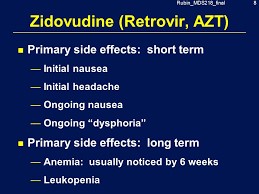A client who is receiving zidovudine reports the appearance of pinpoint, red, round spots on the skin. Which result should the nurse report to the healthcare provider?
Complete blood count.
Allergy test.
Skin biopsy.
Electromyography.
The Correct Answer is A
A) Correct- Zidovudine is an antiretroviral medication used in the treatment of HIV infection.
One of the potential side effects of zidovudine is hematological toxicity, including anemia (low red blood cell count) and neutropenia (low white blood cell count). The appearance of pinpoint, red, round spots on the skin could be indicative of petechiae, which are small hemorrhages caused by the leakage of blood into the skin. Petechiae can occur due to low platelet counts, a
component of the complete blood count (CBC). Monitoring the complete blood count is important for clients receiving zidovudine to identify any potential adverse effects on blood cell counts. Anemia and neutropenia can increase the risk of infection, bleeding, and other complications. Therefore, any changes in blood cell counts, including the presence of petechiae, should be reported to the healthcare provider for further evaluation and management.
B) Incorrect- This is used to assess allergic reactions and is not specifically related to the appearance of petechiae.
C) Incorrect- A skin biopsy is typically performed to diagnose skin conditions or diseases and is not the primary assessment to evaluate the cause of petechiae.
D) Incorrect- Electromyography is a diagnostic test used to assess muscle and nerve function and is not relevant to the appearance of petechiae associated with zidovudine use.

Nursing Test Bank
Naxlex Comprehensive Predictor Exams
Related Questions
Correct Answer is ["A","C","E"]
Explanation
The correct answer/s is Choice/s A, C, and E.
Choice A rationale: Obtaining the client’s tympanic temperature measurement is a crucial step. The client’s confusion and disorientation could be symptoms of an infection, such as a urinary tract infection or pneumonia. Infections in older adults can often present with atypical symptoms, including changes in mental status. Therefore, checking the client’s temperature can help identify if the client has a fever, which is a common sign of an infection.
Choice B rationale: While it’s always important to be aware of a client’s allergies, especially when administering medications, it doesn’t directly address the immediate concern of the client’s altered mental status. Therefore, it’s not the most appropriate action to take in response to the situation described.
Choice C rationale: Asking if the client is experiencing any pain with urination is relevant because urinary tract infections (UTIs) are common in older adults and can cause confusion and other changes in mental status. Pain during urination is a common symptom of a UTI.
Choice D rationale: Encouraging the intake of high protein foods is generally a good recommendation for older adults to maintain their strength and energy levels. However, it’s not directly related to the client’s current symptoms of confusion and disorientation.
Choice E rationale: Determining if the client has recently experienced a fall is important. Falls in older adults can lead to injuries, such as a head injury, which can cause confusion and other changes in mental status. Additionally, some medications used to treat pain after a fall can also contribute to confusion.
Correct Answer is B
Explanation
It is important for the nurse to clarify the client's goals for hospitalization, including the client's understanding of the role of radiation therapy in palliative care. The nurse should also assess the client's understanding of the potential benefits and risks of radiation therapy and communicate this information to the healthcare provider.
Whether you are a student looking to ace your exams or a practicing nurse seeking to enhance your expertise , our nursing education contents will empower you with the confidence and competence to make a difference in the lives of patients and become a respected leader in the healthcare field.
Visit Naxlex, invest in your future and unlock endless possibilities with our unparalleled nursing education contents today
Report Wrong Answer on the Current Question
Do you disagree with the answer? If yes, what is your expected answer? Explain.
Kindly be descriptive with the issue you are facing.
